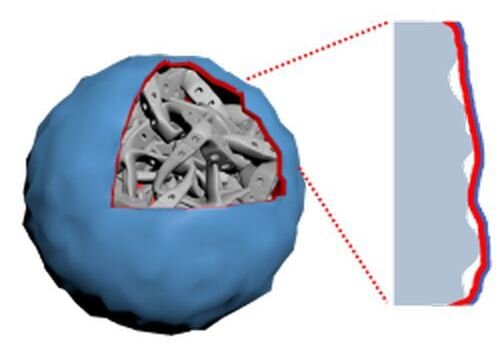Lithium ion batteries have become an indispensable part of daily life. However, in a society where energy is scarce, batteries with longer life, faster charging and lighter weight are still needed to meet the needs of various applications such as electric vehicles and portable electronic products, and even to meet the needs of the army to reduce the weight of soldiers Requirements, because the military will also use a lot of electronic products.

(Source: University of Maryland)
At present, all lithium-ion batteries use graphite as the anode, and the capacity is relatively small. It can be replaced by a silicon anode with a larger capacity and less environmental impact. Although this research direction is promising, batteries containing larger-size silicon anodes tend to have shorter lifespans and generally have less than 50 charge-discharge cycles. When researchers tried to use nanoparticles such as silicon, aluminum and bismuth, they found that such nano-sized alloy anodes still have the problems of short cycle life and high cost.
According to foreign media reports, for this reason, the research teams of the University of Maryland and the Army Research Laboratory have created an electrolyte that can form a protective layer on silicon. The protective layer is very stable and can withstand the expansion of silicon anode particles. The new electrolyte design is reasonable, and the appropriate basic principles are applied to provide room for the silicon anode particles to expand within the protective layer.
Dr. Ji Chen, from the Department of Chemistry and Biomolecular Engineering at the University of Maryland, said: "Our research proves that it is possible to use silicon, aluminum, and bismuth particles as anodes in lithium-ion batteries and to stabilize their cycle life, but only requires a reasonable design of the electrolyte. "
Dr. Xiulin Fan of the University of Maryland is currently a professor at Zhejiang University in China. He said: "The energy density of the battery is determined by the electrode, and the performance of the battery is strictly controlled by the electrolyte. The electrolyte we design can use a miniature alloy anode, which will significantly improve the battery. Energy density. "
The design goal of the current silicon anode electrolyte is to form a uniform polymer layer, that is, the solid electrolyte interface SEI, and the SEI is very flexible and can be closely combined with silicon. However, due to the strong bond between the polymer SEI and silicon, the volume change of the SEI is the same as the volume change of the anode particles. Therefore, during the operation of the battery, the anode particles and the SEI will crack.
Chunsheng Wang, a professor in the Department of Chemistry and Biomolecular Engineering at the University of Maryland, said: "After extensive research on silicon electrodes, the battery industry has reached a consensus that such miniature silicon anodes cannot be used in commercial lithium-ion batteries. However, we have produced a Ceramic SEI with poor adhesion to Lithium Silicone successfully avoids damage to SEI, and the Lithium Silicone can relocate on the interface during the volume change process without damaging the SEI. This electrolyte design principle is applicable to All alloy anode designs provide new opportunities for the development of high-energy batteries. "
However, the researchers said that there are still challenges to commercialize the electrolyte, because the battery voltage is limited to 4.2V and still needs improvement. (Yu Qiuyun)
application: viation,automotive, motorbike, bicycle, automatic equipment, household appliance, medical device ,toy, telecommunication,computer, instrument and meter,furniture, electric tools,mold and other industries
China Torsion Spring,Garage Spring manufacturers, welcome Helical Torsion Spring,Double Torsion Spring purchasers from worldwide to visit our site.
Torsion Spring,Garage Spring,Helical Torsion Spring,Double Torsion Spring,Torsion Spring Manufacturer
Shenzhen Lanejoy Technology Co.,LTD , https://www.szstainlesssteelwiremesh.com